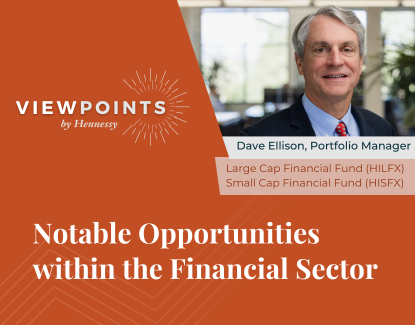Financial Funds Investment Strategy
Portfolio Managers Dave Ellison and Ryan Kelley describe their investment strategy, which seeks high-quality and well managed Financial Services companies.
-
 David EllisonPortfolio Manager
David EllisonPortfolio Manager -
 Ryan C. Kelley, CFAChief Investment Officer and Portfolio Manager
Ryan C. Kelley, CFAChief Investment Officer and Portfolio Manager
Ryan Kelley: The Hennessy Large Cap Financial Fund invests in financial institutions greater than three billion in market cap. We generally have between 25 and 40 names in there. It's a bit more concentrated, and it's exposed to many different sub-industries within financial services. The Small Cap Financial Fund invests in companies less than three billion in market cap. We generally have between 25 and 50 names in there, and they're all over the country as well. They're regional or small community banks that focus on either one state or one region or one part of the country. We think that between the two funds, it gives investors the opportunity to invest in all different market caps within financial services, as well as different industries and areas of the country.
Investment Criteria
Dave Ellison: Well, our big metrics are sort of the traditional metrics, we look at return on assets, we look at return on equity. But we also look at the quality of the loan portfolio, the historical performance there, the quality of the deposit franchise. We look at the capital structure. We look at the markets they're in. We look at their M&A opportunities, that they may or may not have. And if they've done M&A, how they've done it, has it helped shareholders or not. And then we look at really the sustainability of the earnings model. Can they grow book value over a long period of time? We're looking for those types of companies. We look at 700 companies or so in the universe, and we try to boil it down to sort of our favorite 50 or 60 names and then from there, make a portfolio that represents, hopefully, a representation of the best companies in that market across the whole country.
Benefits of an Actively Managed, Concentrated Portfolio
Dave Ellison: Certainly in the market today, there's a lot of talk about active versus passive or indexes. Our goal is really to give you a group of companies that are going to do well over a whole cycle. And so, we've been in a good cycle for many years, meaning the economy's generally been rising, GDP's generally been growing, and the market has generally been going up every year. And, that's an economy that we can stay with the indexes, but really the benefit of what we do is to hopefully protect you when the cycle turns. When we have an '08 again, the hope is that we will have the better companies that will do better in that cycle, take advantage of the cycle, and presumably outperform over that cycle. So that's what we hope to achieve, and that's what we're doing now in the portfolios.
- In this insight:
- Financials
- Small Cap Financial Fund
- Large Cap Financial Fund
You might also like
-
 Portfolio Perspective
Portfolio Perspective
Large Cap Financial FundSmall Cap Financial FundWhat’s Next for Financials After 2024 Outperformance?
 David EllisonPortfolio Manager
David EllisonPortfolio Manager Ryan C. Kelley, CFAChief Investment Officer and Portfolio ManagerRead the Commentary
Ryan C. Kelley, CFAChief Investment Officer and Portfolio ManagerRead the CommentaryPortfolio Managers Dave Ellison and Ryan Kelley discuss what drove 2024 performance in the Financials sector and drivers for potential earnings growth in a lighter regulatory and declining interest-rate environment.
-
 Viewpoint
ViewpointViewpoints by Hennessy with Dave Ellison
 David EllisonPortfolio ManagerWatch the Video
David EllisonPortfolio ManagerWatch the VideoIn the latest episode of Viewpoints by Hennessy featuring Dave Ellison, Portfolio Manager of Hennessy’s Large Cap Financial Fund and Small Cap Financial Fund, he shares his outlook for the financial sector with insights on key holdings like Coinbase, Charles Schwab, and Visa.
-
 Portfolio Perspective
Portfolio Perspective
Large Cap Financial FundSmall Cap Financial FundPerspective on the Financial Sector
 David EllisonPortfolio Manager
David EllisonPortfolio Manager Ryan C. Kelley, CFAChief Investment Officer and Portfolio ManagerRead the Commentary
Ryan C. Kelley, CFAChief Investment Officer and Portfolio ManagerRead the CommentaryPortfolio Managers Dave Ellison and Ryan Kelley discuss their perspective and outlook on the banking industry, banks’ net interest margins and valuations. They also discuss the allocation of the Large Cap Financial Fund and the attributes they seek in smaller banks for the Small Cap Financial Fund.
